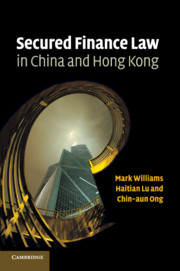Book contents
- Frontmatter
- Contents
- Preface
- Table of cases
- Table of legislation
- 1 Introduction
- 2 Security over tangible personal property
- 3 Security over intangible personal property
- 4 Company security over personal property
- 5 Hire-purchase, leasing and conditional sale of tangible personal property
- 6 Priority of security interests over personal property
- 7 Enforcement, and creditor's remedies
- 8 Conclusion
- Index
- References
4 - Company security over personal property
Published online by Cambridge University Press: 03 May 2011
- Frontmatter
- Contents
- Preface
- Table of cases
- Table of legislation
- 1 Introduction
- 2 Security over tangible personal property
- 3 Security over intangible personal property
- 4 Company security over personal property
- 5 Hire-purchase, leasing and conditional sale of tangible personal property
- 6 Priority of security interests over personal property
- 7 Enforcement, and creditor's remedies
- 8 Conclusion
- Index
- References
Summary
Introduction
The processes of creating, perfecting and publicising company securities in Hong Kong and China differ significantly. In Hong Kong, general law and/or the Companies Ordinance govern these three processes. In China, two statutes, namely the Property Law (2007) and the Security Law (1995), supplemented by the Judicial Interpretation of the Security Law (2000) and various administrative regulations, regulate the creation, perfection and publicity of companies granting security over their assets.
In theory, companies in Hong Kong may grant their creditor a mortgage or a charge over personal property in the same way as individuals. However, in practice, it is common for company debtors to execute a special document known as a ‘debenture’. The expression ‘debenture’ is commonly used in two situations, namely when the company raises debt capital from the public (in the case of a public company) or privately from financial institutions. Discussion here is strictly confined to the latter situation.
Chitty J described a debenture as ‘a document which either creates a debt or acknowledges it, and any document which fulfils either of these conditions is a debenture’. Section 2(1) of the Companies Ordinance (Cap. 32) gives the term a much broader meaning. It provides that ‘debenture’ includes debenture stock, bonds and any other securities of a company, whether constituting a charge on the assets of the company or not. However, today, whether a document is a debenture rarely poses any serious ‘juristic debate’ in theory or in practice.
- Type
- Chapter
- Information
- Secured Finance Law in China and Hong Kong , pp. 145 - 218Publisher: Cambridge University PressPrint publication year: 2010



